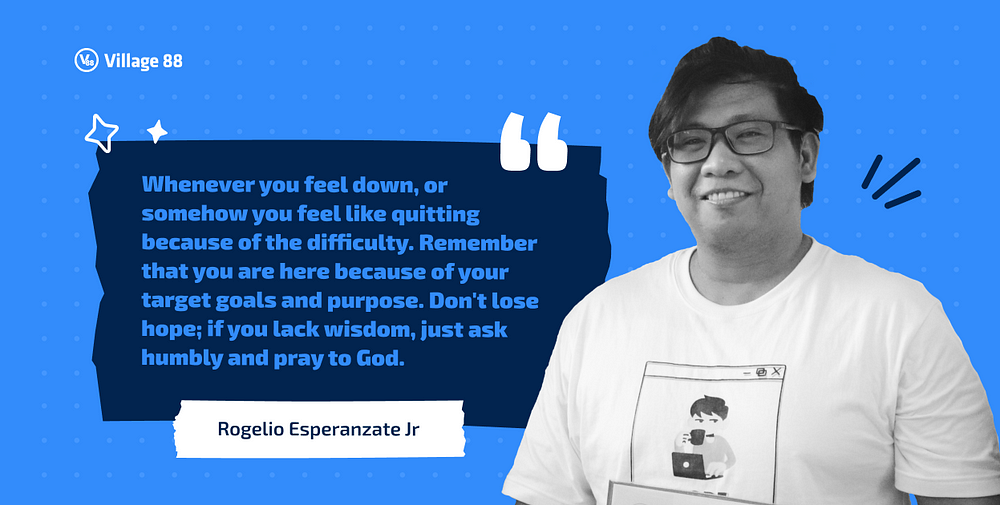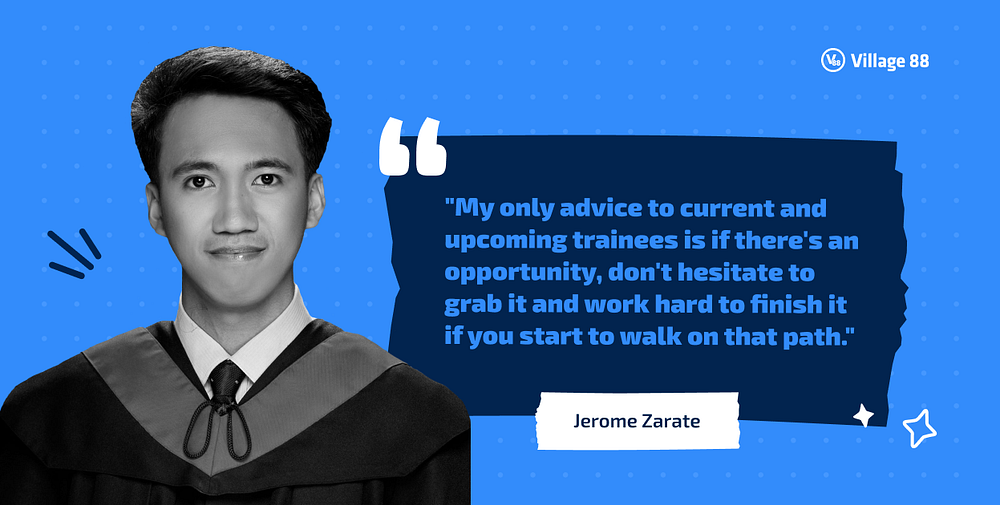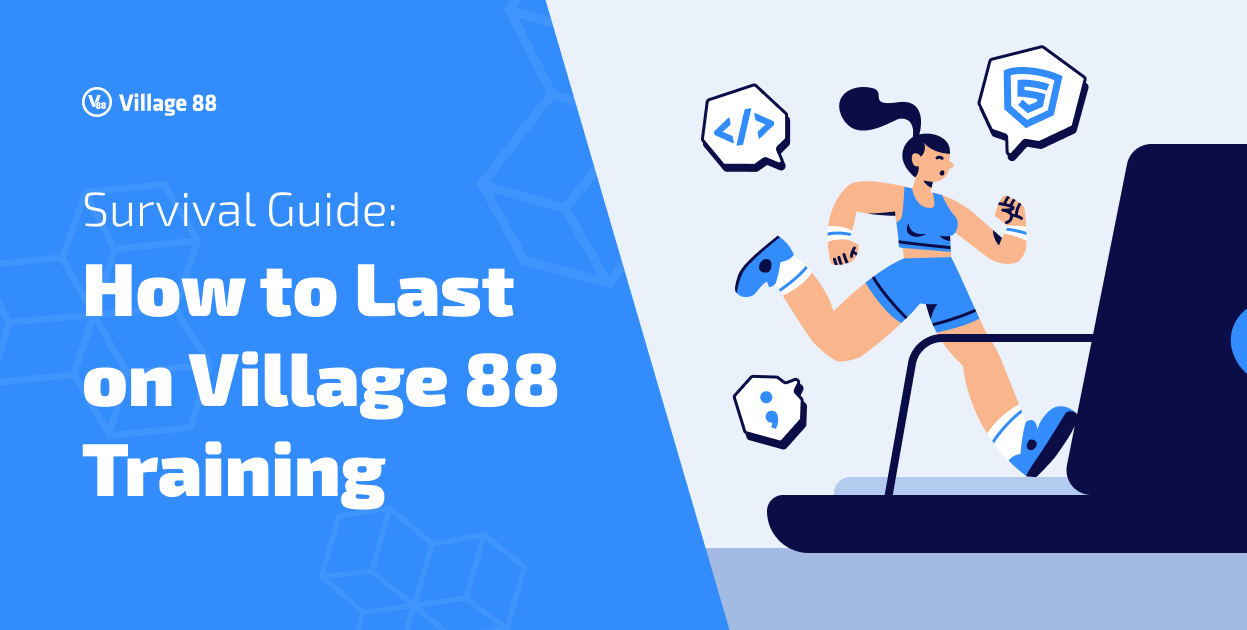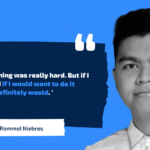As cliché as it sounds, only the fittest survive Village 88 Training. We said it before, as do most of our alums: Village 88 Training is not for the faint of heart. It is a rigorous, intensive, extensive training program designed to help anyone level up their coding skills in a short period.
To help you survive the training, we collected tips from two of our alums, Rogelio Esperanzate Jr from Metro Manila and Jerome Zarate from La Union.
Let’s get to know them first. Jerome is a Batch 1 alum with a degree in Electronics and Communication Engineering, and Rogelio is a Batch 2 alum who is a graduate with a Bachelor of Science in Information and Communication Technology.
Remember your goals
It is easy to give up when things get more challenging. So, how do you combat that?
Dr. Stephen R. Covey said in his book “The 7 Habits of Highly Effective People” to “begin with the end in mind” this means trainee-developers must begin each day, task, or project with a clear vision of their goal to become better developers.
As a trainee, you must set your eyes and efforts towards your desired direction and destination and then continue by flexing your developer muscles to devise a solution, solve problems and make things happen.
Take it from Rogelio and Jerome. He shared, “When things are hard during the training, I remind myself that I’m in this training because I want to change. I’m here because I have a purpose. How can I be a good developer someday if I don’t finish the course?”
“I wanted to improve my programming skills through Village88 Training. The knowledge I would gain kept me going during the training, even though it was hard.” Jerome shared.
Remember your goal when you hit those inevitable roadblocks when things get tough for you. You’ll get through it if you stay focused on the finish line! Remember why you started when you’re about to give up and end your journey towards becoming a better developer.
Do some coding self-study
“I reviewed my answers on the preparatory course Learn to Code and Basic Algorithms at the HackerHero website. Through the course, I improved my logical thinking skills.” ~Rogelio
“Before our training started, I researched, watched videos, and read about the topics to be discussed.” ~Jerome
When you first register for the training, you are encouraged to do some prerequisite tasks and self-paced warm-up exercises to help you better prepare for the training.
You must know that we don’t spoon-feed trainees. We provide access to some of our training platforms and materials, so you can study without relying solely on your instructors.
Self-study allows you to take learning at your own pace, focusing on areas you want to understand a bit better or you’re most interested in. Doing this helps reduce feelings of frustration, anxiety, or boredom that you may struggle with during the training.
Prepare to learn by doing
Learning by doing is one of the best ways developers can level up their logical thinking and software development skills. Concepts and theories are useless if you don’t put them into practice. We require hands-on learning, assignments, assessments, and capstone projects. You can gain conceptual insights and practical experience through project-based learning and assessment.
Kris McCrea Scrutchfiled of McCrea Coaching shared, “Learning by doing provides the learner with instant feedback and the ability to reflect on what to keep doing, what to tweak and repeat, or what to change altogether.”
Begin each training day with the mindset that you will primarily “learn by doing.” Write lines of code. Test it. If the codes don’t work, change them. Still not working? Change them again. Then, suddenly the codes worked! In a nutshell, that’s how you learn coding by doing.
To give you a glimpse of what a typical training day looks like, here’s Rogelio detailing his typical day: “During the training, we will start our training at 8 am for a one-hour zoom session meeting. Then the rest of the day will be just answering task assignments. I usually sleep at 10 pm. There will be sleepless nights because of the difficulty of the assignments and cramming for capstone projects.”
Ask a lot of questions
“Learn avidly. Question repeatedly what you have learned. Analyze it carefully. Then put what you have learned into practice intelligently.” — Edward Cocker.
Don’t be shy. Ask questions. No one expects you to know or understand everything you will encounter during the training. What you thought you knew might be entirely different or far from the truth. Only when you ask can you find answers and enlightenment. Remember, the art and science of asking questions is the source of all knowledge.
Rogelio’s advice is to “always practice asking effective questions.”
Don’t bring your ego into class.
As human beings, we have egos to feed, but you shouldn’t bring them into the training. It can be easy to get defensive, self-protect, and justify errors. Be humble and open to learning. Admit when you commit mistakes.
Remember, you’re not there because you are the greatest. You’re there because you have some things to learn.
“Practice cooperation by actively volunteering to present your assignments.” Rogelio was always willing to present his assignments in class, not because they were perfect, but because he wanted to learn.
Learn with and from fellow trainees
You know what they say, misery loves company. Kidding aside, your fellow trainees are going through the same things as you are. Don’t be afraid to ask for help when you’re struggling with something. And don’t be stingy too. Help those who need your help. They might know something that you don’t, and you might understand something better than they do.
Make some friends. Remember, man is an island. Talk, discuss, ask questions, and share insights. You may not have all the answers, but you can help each other figure things out. Do not look at each other as competition, but as a possibility for networking and lasting friendship. Struggle and finish together.
Jerome’s perspective and what he thought he should have done differently now that he’s graduated, “Going the extra mile and communicating better with my co-trainees.”
You go through the cohort with your batchmates only once. You can’t take back lost time. Make the most out of your time together.
Rest, rejuvenate, and reward yourself
Your passionate desire to learn is commendable, but don’t over-exert yourself. You might end up burnt out and stunt your learning. Learn to rest. Don’t forget to take breaks. Stand up, look away from your computer, or stretch. Strive for six to eight hours of sleep every day. There’s no more effective way to kill your productivity than lack of sleep.
Allot at least ten minutes to exercise. Walk, run, jump rope, do some push-ups, or do some yoga exercises. It doesn’t take much to rejuvenate, and your brain and body will thank you for the needed energy boost.
The training is challenging and rigorous, and you should learn to reward yourself. Look back and pat yourself on the back for holding on and doing your best. Celebrate small and big successes. Treat yourself to a sweet drink or a nice meal. You can also buy something you’ve meant to purchase for a while.
Jerome and Rogelio left their advice for the ongoing and upcoming trainees of Village 88 Training.


It’s not always the strongest or the smartest that lasts or survives. According to Charles Darwin, “In the struggle for survival, the fittest win out at the expense of their rivals because they succeed in adapting themselves best to their environment.” Surviving hardships of whatever kind will require your adaptiveness and willingness to change your ways, whether in training or your future professional life.
We hope you remember this survival guide while you’re going through the training. And for those still deciding whether to join Village 88 Training, take your time thinking about it. You can always register and apply.
When you’ve finally decided to commit to the training, visit our Facebook page to learn more or our website to apply.





